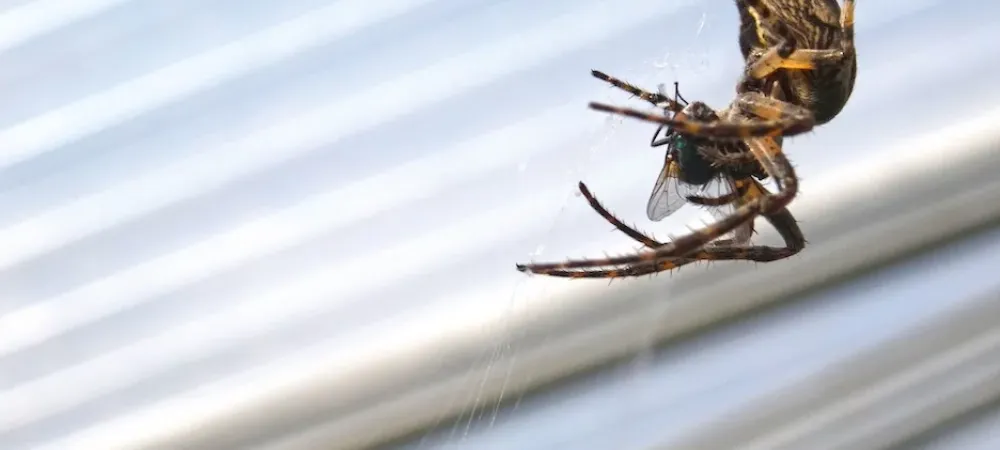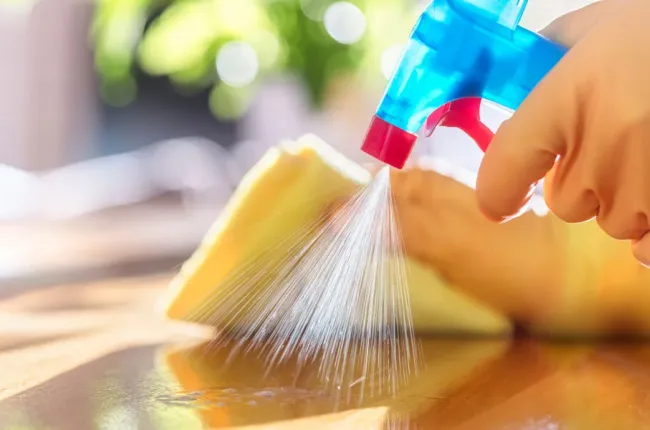Why Are There So Many Spiders In My House?

There are many reasons why you might have noticed an increase in spiders in your home.
- Spiders prefer warm, damp environments and can easily take up residence in dark places such as behind furniture or in basements.
- Other factors that could be contributing to a spider population explosion include the presence of other insects for them to feed on, such as flies, moths, and other insects which can serve as a food source.
- Additionally, spiders tend to come inside during late summer and fall in search of a mate—this could explain why you are noticing them more frequently now.
What Attracts House Spiders?
House spiders are attracted to a variety of factors that provide them with the resources they need to survive. Some of the most common factors that attract house spiders include:
- Food: Arachnids are attracted to areas where there are other insects for them to eat. This includes places where there are flies, mosquitoes, silverfish, and other common household pests.
- Shelter: They are also attracted to areas where they can find shelter and build webs. This includes corners, crevices, and other tight spaces where they can spin their webs without being disturbed.
- Moisture: House spiders need a certain amount of moisture to survive. They are attracted to areas of the house that are humid, such as basements, bathrooms, and laundry rooms.
- Light: Some species of spiders are attracted to light, and they can be found near windows or other sources of light.
- Vibrations: These critters are also attracted to vibrations, such as those caused by moving furniture, walking, or other activities. This can cause them to spin webs in areas where there is a lot of movement.
- Lack of regular cleaning: A cluttered and disorganized house can attract spiders. If your house is not regularly cleaned, it can provide an ideal place for spiders to live.
It's also important to note that not all house spiders are attracted to the same things, different species may have different preferences and necessities. Therefore, it's essential to identify the type of spider and the reasons that attract them to take the right actions.
How To Keep Spiders Out of Your House
There are several ways to keep spiders out of your house:
- Seal cracks and crevices: Spiders can enter your house through small openings, such as cracks in the foundation or gaps around windows and doors. Use caulk or weather stripping to seal these openings and prevent pests from entering.
- Remove webs and egg sacs: Regularly remove webs and egg sacs that you find in your house. This will discourage adult spiders from setting up residence in your home.
- Keep a clean house: To reduce hiding places, keep your house clean and tidy, particularly in areas where spiders are commonly found, such as basements and attics.
- Control other pests: Spiders are attracted to areas where there are other insects for them to eat. Keep other pests, such as ants and flies, under control to reduce the likelihood of arachnids entering your home.
- Use natural repellents: Some natural products such as peppermint oil, citrus, or eucalyptus can act as repellents for spiders. You can use them as a spray or put sachets around the house.
- Use mechanical barriers: You can use mechanical barriers such as door sweeps, window screens, and weatherstripping to keep spiders from entering your house.
It's also important to note that these methods may not completely eliminate the presence of spiders in your house, but they will help to keep their numbers down, and they'll be less likely to stay.

DIY Natural Spider Repellents
There are several natural remedies that you can use to repel spiders in your home:
- Essential oils: Essential oils such as peppermint, citrus, tea tree, or eucalyptus can act as natural repellents for spiders. You can use them to make a spray by mixing 15-20 drops of essential oil with 1 cup of water, or you can place cotton balls soaked in the oil in areas where spiders are commonly found.
- Vinegar: A solution of equal parts water and vinegar can be sprayed in areas where spiders are commonly found. The strong odor of vinegar can repel spiders and make your home less attractive to them.
- Citrus peels: Spiders do not like the strong smell of citrus, so placing citrus peels, such as lemon, orange, grapefruit, or other types of citronella, in areas where spiders are commonly found can repel them.
- Diatomaceous earth: This natural powder, made from fossilized algae, can be spread around the house in areas where pests are commonly found. The small sharp particles can damage the arachnids' exoskeleton and will cause them to dehydrate and die.
- Bay leaves and clove sachets: You can make sachets filled with bay leaves and cloves to place around your house. Simply fill small cloth bags with the dried herbs and place them in areas where pests are commonly found.
- Garlic and chili pepper spray: Mix 5 cloves of minced garlic and 1 teaspoon of chili pepper flakes in a liter of water. Let it sit for a day, strain and put it in a spray bottle. Spray in areas where spiders are commonly found.
Again, it's important to note that while these remedies can help to repel spiders, they may not completely eliminate the presence of spiders in your house. However, these natural spider deterrents can be a useful tool to make your house less attractive to them and reduce their numbers.
How to Get Rid of Spiders In Your House
There are several ways to get rid of spiders in your house:
- Vacuuming: Regular vacuuming of your house can help to remove spiders, their webs, and eggs. Be sure to vacuum around windows, corners, and other areas where pests are commonly found.
- Use a spider trap: Traps are a great way to catch and remove spiders from your house. You can purchase these traps or make your own by using a container, such as a jar, and some sticky substance, like petroleum jelly.
- Use a chemical spray: Chemical sprays, such as those containing pyrethrin or permethrin, can be used to kill spiders and their eggs. Be sure to read the label and follow the instructions carefully, and avoid using sprays near food or in areas where children and pets may come into contact with them.
- Professional help: If you have a severe spider infestation or are concerned about venomous spiders, it may be necessary to seek professional help to eliminate the problem. Pest control professionals have the tools and expertise to effectively eliminate spiders and prevent them from returning.
If you live in Washington DC, Maryland, or Virginia and are in need of professional spider removal, look no further than Senate Termite & Pest Control. With over 30 years of experience, we know exactly how to get rid of spiders for good. We even provide year-round pest protection, which can help to prevent household pests from infesting your home and attracting other critters. Contact us today to learn more.
Here are some of the most common questions our experienced exterminators get when it comes to finding these critters in your house.
What Are The Most Common Spiders You Can Find In Your House?
The most common types of spiders you might find in your home can vary depending on your location, but here are some of the more common species:
-
House spiders (Tegenaria domestic), also known as the common house spider, are often found in dark corners, basements, and attics. They build irregular webs and are generally harmless to humans.
-
Cellar spiders (Pholcus phalangioides), commonly referred to as daddy longlegs, have long, thin legs and build messy, cobweb-like webs. They are typically found in basements, cellars, and other dark and damp areas.
-
Cobweb spider (Family Theridiidae)—this family includes various species, such as the American house spider (Parasteatoda tepidariorum) and the black widow spider (Latrodectus spp.). They construct cobweb-like structures and can be found in secluded areas of the home, including garages and sheds.
-
Jumping spider (Family Salticidae) are known for their ability to leap on prey. They are often small and have excellent vision. They can be found indoors near windows, walls, and ceilings.
-
Wolf spider (Family Lycosidae) are known for their fast movements and hunting behavior. They do not build webs but instead actively search for prey. Wolf spiders can occasionally be found indoors, particularly in basements and crawl spaces.
It's important to note that the vast majority of spiders you encounter in your home are harmless and actually beneficial, as they help control other pests like flies and mosquitoes. If you're concerned about spiders in your home, it is best to call a pest control expert to help identify the arachnid—especially if you have a fear of spiders.
Where Do Spiders Like To Hide?
Spiders can hide in various locations within your house, depending on the species and their preferences. Here are some common areas where spiders may seek shelter:
- Corners and crevices: Spiders often hide in corners where walls meet or where furniture meets the floor. Look for them in the corners of rooms, behind furniture, and along baseboards.
- Ceilings and light fixtures: Some spiders, like cobweb spiders, may build their webs near ceilings or light fixtures. Check these areas for signs of spider activity.
- Cluttered areas: Spiders tend to prefer undisturbed areas with clutter, such as storage rooms, basements, attics, and garages. Boxes, piles of clothing, and other stored items can provide hiding places for them.
- Vents and ducts: Spiders may find their way into vents and ducts, especially if there are gaps or openings. Inspect these areas for any signs of spider webs or activity.
- Plants and vegetation: If you have indoor plants or potted flowers, the critters may hide among the leaves or in the soil. Check around your plants for any spider webs.
- Dark and undisturbed areas: Arachnids prefer dark and undisturbed places where they can build their webs and catch prey. This could include storage closets, under furniture, or behind curtains.
Remember that spiders generally prefer areas with a ready food source, such as flies or other insects. If you have an abundance of insects in your home, spiders may be more likely to stick around. Regular cleaning, decluttering, and sealing entry points can help reduce the presence of spiders in your house.
When Are Spiders Most Active?
Spiders are generally most active during the warmer months, from spring to early autumn, when their prey, such as insects, are also abundant. However, the activity level of spiders can vary depending on the species and their habitat.
It's worth noting that not all spiders follow strict patterns of activity, and individual behavior can vary. Additionally, some spiders may exhibit seasonal changes in their activity, becoming less active during colder months or entering a dormant state.

